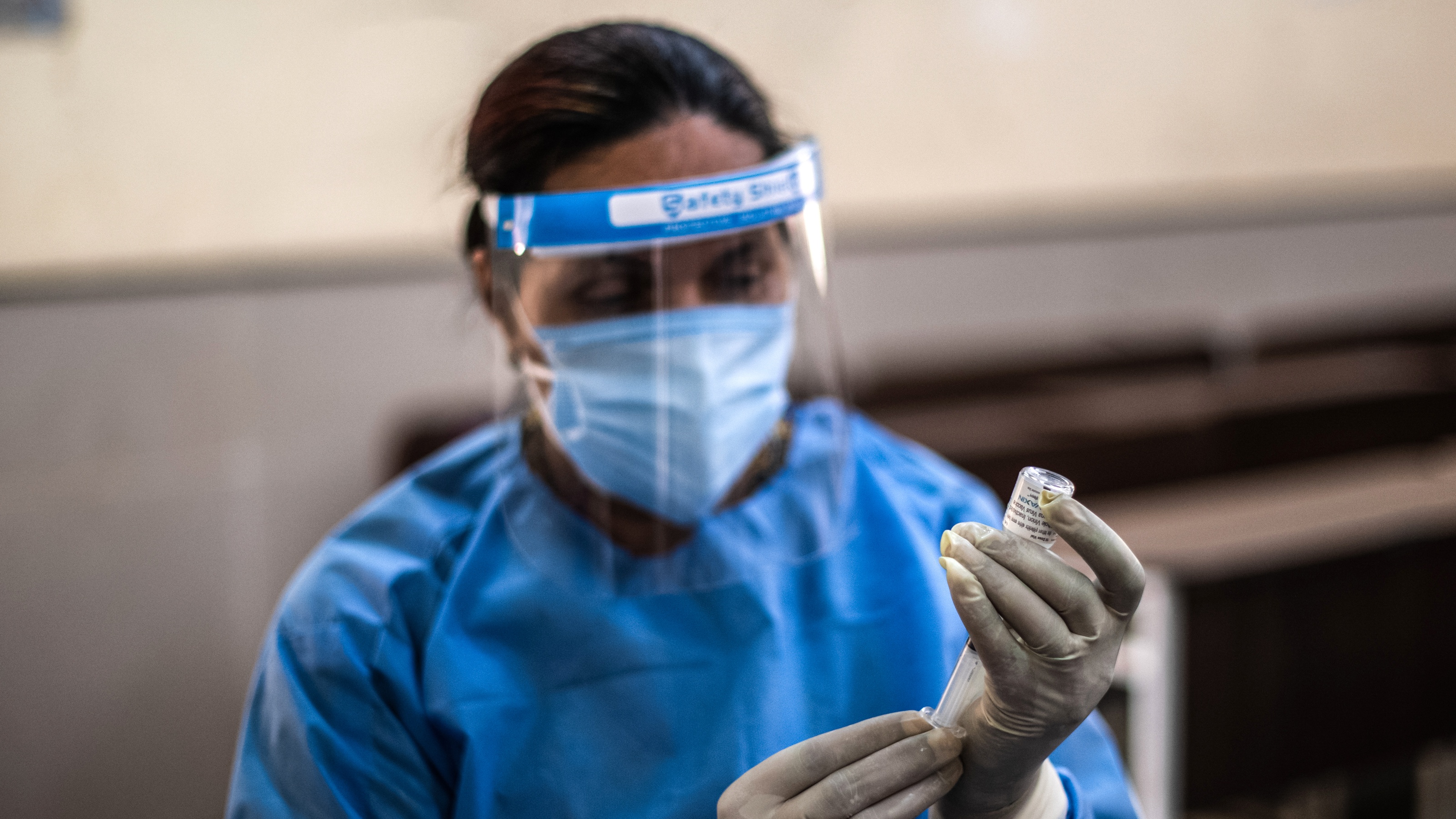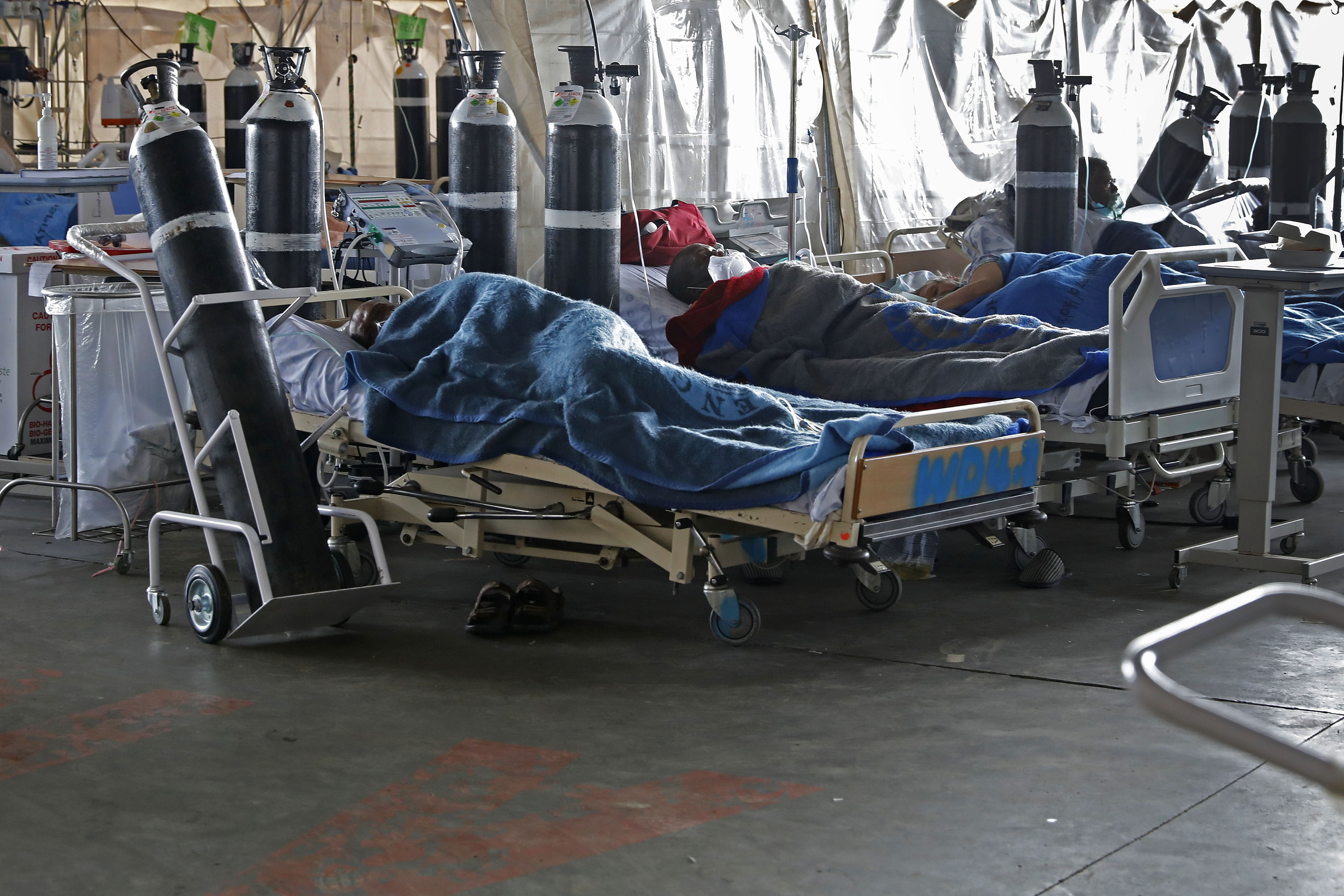What a waiver on Covid vaccine patents would mean for global rollout
US is backing plan to suspend protections in order to boost coronavirus jabs supply

A free daily email with the biggest news stories of the day – and the best features from TheWeek.com
You are now subscribed
Your newsletter sign-up was successful
Plans to suspend patent protections on Covid-19 vaccines are gaining momentum as the US and EU join the growing list of advocates for the move.
The proposed temporary waiver was first suggested by India and South Africa at a World Trade Organization (WTO) meeting in October and is “gathering support from a large number of developing countries”, Reuters reports. The plan’s backers argue that making coronavirus jabs more widely available is a “vital step” in combating the global pandemic, says the news agency.
The US had previously withheld its support, however, alongside the EU, UK, Japan, Switzerland, Brazil and Norway. But now supporters of the waiver are hoping that “US leadership on the issue could help sway other holdouts”, following the change of heart by Joe Biden’s administration, says Al Jazeera.
The Week
Escape your echo chamber. Get the facts behind the news, plus analysis from multiple perspectives.

Sign up for The Week's Free Newsletters
From our morning news briefing to a weekly Good News Newsletter, get the best of The Week delivered directly to your inbox.
From our morning news briefing to a weekly Good News Newsletter, get the best of The Week delivered directly to your inbox.
Widening supply
Announcing the policy U-turn on Wednesday, US Trade Representative Katherine Tai said: “We are for the waiver at the WTO, we are for what the proponents of the waiver are trying to accomplish, which is better access, more manufacturing capability, more shots in arms.”
Tai added that “extraordinary times call for extraordinary measures. Given what is at stake, this is the best chance for the WTO to be able to come together to deliver something that is going to help people and make a difference.”
President Biden had “come under increasing pressure to throw his support behind the proposal”, The New York Times (NYT) reports. Congressional Democrats including former presidential nomination candidates Bernie Sanders and Elizabeth Warren joined in pushing for what is now being heralded as a “breakthrough” in the international effort to ramp up vaccine production.
A free daily email with the biggest news stories of the day – and the best features from TheWeek.com
On the other side of the argument, the pharmaceutical industry has warned “that handing over vaccine technology to China and Russia would hurt their ability to compete”, reports Al Jazeera.
But despite that opposition, the EU - home to some of the world’s biggest pharma firms - swiftly followed the US by announcing that the bloc is also willing to consider the waiver plan.
The EU is “ready to discuss any proposals that address the crisis in an effective and pragmatic manner”, European Commission President Ursula von der Leyen said in a speech to the European University Institute in Florence yesterday. “That’s why we are ready to discuss how the US proposal for a waiver on intellectual property protections for Covid-19 vaccines could help achieve that objective.”
Not all EU leaders are sold on the idea, however. A spokesperson for German Chancellor Angela Merkel told Bloomberg yesterday that the move would create “severe complications” for the production of vaccines.
“The limiting factor for the production of vaccines are manufacturing capacities and high quality standards, not the patents,” the spokesperson said. “The protection of intellectual property is a source of innovation and this has to remain so in the future.”
With nations split over the waiver plans, US Trade Representative Tai acknowledged that negotiations to reach a consensus “will not be easy”. Tai told press that “in terms of how soon the WTO can deliver - that literally depends on the WTO members, collectively, being able to deliver” an agreement.
WTO Director-General Ngozi Okonjo-Iweala has urged member states to push on with talks, telling a meeting of the organisation’s General Council that she is “firmly convinced that once we can sit down with an actual text in front of us, we shall find a pragmatic way forward”.
Jab monopoly
India and South Africa - both of which are currently battling major Covid outbreaks - argue that temporarily suspending rules on intellectual property (IP) rights” “would be the most efficient and equitable way to address vaccine shortages in poor countries”, Al Jazeera reports.
The BBC explains that patents “prevent copying and allow the originator to be financially rewarded”, with companies handed “a short-term monopoly on production to cover the costs of development and encourage investment”.
However, supporters of the vaccines waiver plan argue that “rules requiring countries to protect patents and other forms of intellectual property” are an “obstacle” to increasing manufacturing of the much-needed jabs and and providing “more affordable doses for less wealthy countries”, says the broadcaster.

Some activists have gone further, arguing that “a waiver alone will not boost world supply” and that the move should be combined with a process known as a “tech transfer” - where “patent holders supply technical know-how and personnel”, the NYT reports.
“This is a start,” waiver advocate Gregg Gonsalves, a Yale University epidemiologist, told the paper. “We need the writing of the text of this waiver now to be transparent and public, but as we have always said we need tech transfer now.”
The waiver plan has also been backed by the international president of Medecins Sans Frontieres (Doctors Without Borders). In a statement, Dr Christos Christou said that the landmark proposal “offers all governments opportunities to take action for better collaboration in development, production and supply of Covid-19 medical tools without being restricted by private industry’s interests and actions”.
“Crucially, [a waiver] would give governments all available tools to ensure global access,” he continued, adding: “Countries must stop stonewalling and show the leadership required to deliver on the ‘global solidarity’ they have so often declared during this pandemic.”
Members of the WTO held fresh talks on Wednesday about the proposal, with “further discussions” expected in the coming weeks as India and South Africa prepare “a revised plan for nations to consider”, the NYT reports.
Pharma pushback
While the plan is being embraced by international health organisations and many politicians, pharma companies are warning that green-lighting the waiver “could stifle innovation”, reports the BBC.
The head of the International Federation of Pharmaceutical Manufacturers and Associations, Thomas Cueni, told the broadcaster’s Today programme that he was “deeply concerned if you hand this over and allow companies to try to get it done the right way, safe and high quality, you could compromise the quality and safety of vaccines which we see now and it would be disruptive”.
Other drugmakers have argued that “few countries have the capacity to produce more vaccines even if they knew the formulas”, Al Jazeera reports. The firms also claim “there’s limited global supply of the materials needed, and building new factories with the necessary technology to produce the vaccines could take years”, the news site adds.
Underlining that warning, patent attorney David Silverstein told Pharmaceutical Technology that a waiver is not “the silver bullet that it is generally regarded as”.
“It is not so much the blueprints for these vaccines that is the real barrier here - there are many more barriers,” he said.
Using the metaphor of Elon Musk’s Space X project, Silverstein added that the patents on the billionaire’s rockets “are not what is keeping me as an individual or my firm from making rockets. We need specialised equipment - we need trained personnel and we need the infrastructure to support it.”
The US pharmaceutical industry is seizing on these difficulties as reasons not to grant the temporary waiver, along with the financial hit they would face. But US Trade Representative Tai has called on the multinationals to make sacrifices in order to help tackle the Covid crisis.
“The desperate needs that our people face in the current pandemic provide these companies with an opportunity to be the heroes they claim to be - and can be,” she said at a virtual WTO conference in April.
“As governments and leaders of international institutions, the highest standards of courage and sacrifice are demanded of us in times of crisis. The same needs to be demanded of industry.”
-
 The EU’s war on fast fashion
The EU’s war on fast fashionIn the Spotlight Bloc launches investigation into Shein over sale of weapons and ‘childlike’ sex dolls, alongside efforts to tax e-commerce giants and combat textile waste
-
 How to Get to Heaven from Belfast: a ‘highly entertaining ride’
How to Get to Heaven from Belfast: a ‘highly entertaining ride’The Week Recommends Mystery-comedy from the creator of Derry Girls should be ‘your new binge-watch’
-
 The 8 best TV shows of the 1960s
The 8 best TV shows of the 1960sThe standout shows of this decade take viewers from outer space to the Wild West
-
 Epstein files topple law CEO, roil UK government
Epstein files topple law CEO, roil UK governmentSpeed Read Peter Mandelson, Britain’s former ambassador to the US, is caught up in the scandal
-
 Iran and US prepare to meet after skirmishes
Iran and US prepare to meet after skirmishesSpeed Read The incident comes amid heightened tensions in the Middle East
-
 Israel retrieves final hostage’s body from Gaza
Israel retrieves final hostage’s body from GazaSpeed Read The 24-year-old police officer was killed during the initial Hamas attack
-
 China’s Xi targets top general in growing purge
China’s Xi targets top general in growing purgeSpeed Read Zhang Youxia is being investigated over ‘grave violations’ of the law
-
 Panama and Canada are negotiating over a crucial copper mine
Panama and Canada are negotiating over a crucial copper mineIn the Spotlight Panama is set to make a final decision on the mine this summer
-
 Why Greenland’s natural resources are nearly impossible to mine
Why Greenland’s natural resources are nearly impossible to mineThe Explainer The country’s natural landscape makes the task extremely difficult
-
 Iran cuts internet as protests escalate
Iran cuts internet as protests escalateSpeed Reada Government buildings across the country have been set on fire
-
 US nabs ‘shadow’ tanker claimed by Russia
US nabs ‘shadow’ tanker claimed by RussiaSpeed Read The ship was one of two vessels seized by the US military